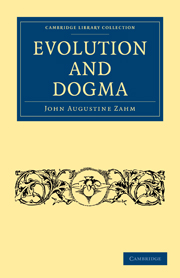Book contents
- Frontmatter
- PREFATORY NOTE
- Contents
- INTRODUCTION
- PART I EVOLUTION, PAST AND PRESENT
- PART II EVOLUTION AND DOGMA
- CHAPTER I MISCONCEPTIONS OF THEORY, ERRORS IN DOCTRINE AND MISTAKES IN TERMINOLOGY
- CHAPTER II MONISM AND EVOLUTION
- CHAPTER III AGNOSTICISM AND EVOLUTION
- CHAPTER IV THEISM AND EVOLUTION
- CHAPTER V THE ORIGIN AND NATURE OF LIFE
- CHAPTER VI THE SIMIAN ORIGIN OF MAN
- CHAPTER VII TELEOLOGY, OLD AND NEW
- CHAPTER VIII RETROSPECT, REFLECTIONS AND CONCLUSION
- AUTHORS AND WORKS CITED IN “EVOLUTION AND DOGMA.”
- GENERAL INDEX
CHAPTER IV - THEISM AND EVOLUTION
Published online by Cambridge University Press: 29 August 2010
- Frontmatter
- PREFATORY NOTE
- Contents
- INTRODUCTION
- PART I EVOLUTION, PAST AND PRESENT
- PART II EVOLUTION AND DOGMA
- CHAPTER I MISCONCEPTIONS OF THEORY, ERRORS IN DOCTRINE AND MISTAKES IN TERMINOLOGY
- CHAPTER II MONISM AND EVOLUTION
- CHAPTER III AGNOSTICISM AND EVOLUTION
- CHAPTER IV THEISM AND EVOLUTION
- CHAPTER V THE ORIGIN AND NATURE OF LIFE
- CHAPTER VI THE SIMIAN ORIGIN OF MAN
- CHAPTER VII TELEOLOGY, OLD AND NEW
- CHAPTER VIII RETROSPECT, REFLECTIONS AND CONCLUSION
- AUTHORS AND WORKS CITED IN “EVOLUTION AND DOGMA.”
- GENERAL INDEX
Summary
Evolution and Faith
HAVING eliminated from our discussion the forms of Evolution held by the divers schools of monists and agnostics, there now remains but the third form, known as theistic Evolution. Can we, then, consistently with the certain deductions of science and philosophy, and in accordance with the positive dogmas of faith—can we as Christians, as Catholics, who accept without reserve all the teachings of the Church, give our assent to theistic Evolution? This is a question of paramount importance, one which is daily growing in interest, and one for an answer to which the reading public has long been clamoring. And with it must also be answered a certain number of cognate questions, of scarcely less interest and importance than the main question of Evolution itself.
I have elsewhere shown that the principles of theistic Evolution—the Evolution, namely, which admits the existence of a God, and the development, under the action of His Providence, of the universe and all it contains—were accepted and defended by some of the most eminent Doctors of the early Greek and Latin Churches. It was a brilliant luminary of the Oriental Church. St. Gregory of Nyssa, who first clearly conceived and formulated the nebular hypothesis, which was long centuries subsequently elaborated by Laplace, Herschel and Faye. The learned prelate found no difficulty in admitting the action of secondary causes, in the formation of the universe from the primal matter which the Almighty had directly created.
- Type
- Chapter
- Information
- Evolution and Dogma , pp. 279 - 319Publisher: Cambridge University PressPrint publication year: 2009First published in: 1896



